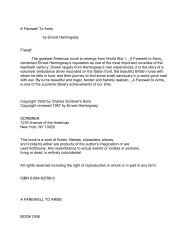- Page 2 and 3:
English GrammarENGLISH GRAMMAR: EXP
- Page 4 and 5:
a. Questionsb. Negative statementsc
- Page 6:
a. The Simple Present indicativeb.
- Page 9 and 10:
5. The use of some and any6. The us
- Page 11 and 12:
3. Interrogative adverbsExercisesCH
- Page 13 and 14:
THE USES AND FORMATION OF THE ENGLI
- Page 15 and 16:
**** The other modal auxiliaries co
- Page 17 and 18:
she showit showwe showthey showshe
- Page 19 and 20:
Past PerfectI had beenyou had beenh
- Page 21 and 22:
we have been beingthey have been be
- Page 23 and 24:
hit hit hithold held heldhurt hurt
- Page 25 and 26:
It should be kept in mind that many
- Page 27 and 28:
subject you, whether you refers to
- Page 29 and 30:
They are awake.They are awake, aren
- Page 31 and 32:
12. not, you, late13. it, not, ?, i
- Page 33 and 34:
When a verb ends in y immediately p
- Page 35 and 36:
Auxiliaries are verbs which are com
- Page 37:
6. He ____ the office every day. (t
- Page 40 and 41:
ANSWERS TO THE EXERCISES for Chapte
- Page 42 and 43:
a. Verbs ending in a silent eWhen a
- Page 44 and 45:
When a verb of more than one syllab
- Page 46 and 47:
not is placed after the subject. Ho
- Page 48 and 49:
It _____. (to rain)It is raining.1.
- Page 50 and 51:
They are being cautious, aren't the
- Page 52 and 53:
2. Formation of the present perfect
- Page 54 and 55:
stress. In the following examples,
- Page 56 and 57:
tense is the same for an irregular
- Page 58 and 59:
The use of the Present Perfect Cont
- Page 60 and 61:
2. Rewrite the following sentences,
- Page 62 and 63:
1. We _______ lunch. (to eat)2. 1 _
- Page 64 and 65:
1. has apologized 2. have stirred 3
- Page 66 and 67:
was notwere notwasn'tweren'tIn orde
- Page 68 and 69:
See Exercise 5.In order to change a
- Page 70 and 71:
Were you not on ti me?Weren't you o
- Page 72 and 73:
contractions and the forms with con
- Page 74 and 75:
form, as well as other modal forms.
- Page 76 and 77:
tag questions are underlined. Contr
- Page 78 and 79:
In the preceding examples, the verb
- Page 80 and 81:
Emphatic statements are often used
- Page 82 and 83:
2. We ________ money. (to save)3. S
- Page 84 and 85:
4. ___ they ______ the letter? (to
- Page 86 and 87:
13. You did not ________ my letter.
- Page 88 and 89:
8. He was right. 9. She does unders
- Page 90 and 91:
will notwon'tThe contracted form of
- Page 92 and 93:
It should also be noted that the Pa
- Page 94 and 95:
they will have workedSee Exercise 9
- Page 96 and 97:
Tag questions are formed using the
- Page 98 and 99:
e.g. We will welcome him when he ar
- Page 100 and 101:
We will pass the exam.You _____ the
- Page 102 and 103:
9. Using either the auxiliary shall
- Page 104 and 105:
1. She_______________to help us. (t
- Page 106 and 107:
solved 9. shall have received or wi
- Page 108 and 109:
Negative Statement:Negative Questio
- Page 110 and 111:
They would not have worked.Negative
- Page 112 and 113:
The following table summarizes the
- Page 114 and 115:
3. I ________ everything carefully.
- Page 116 and 117:
7. He ___ not _______ it to your ol
- Page 118 and 119:
Would she have been preparing for t
- Page 120 and 121:
1. Would he have been listening to
- Page 122 and 123:
they werethey wereFor any verb, the
- Page 124 and 125:
we had workedthey had workedwe had
- Page 126 and 127:
In each of these examples, the use
- Page 128 and 129:
See Exercise 6.As well as being exp
- Page 130 and 131:
. Forms of the verb used in the sub
- Page 132 and 133:
6. The imperative moodThe Imperativ
- Page 134 and 135:
Does she wish it would snow?You wil
- Page 136 and 137:
___ shenot _____ if she had seen us
- Page 138 and 139:
emind)3. ___ I ____ earlier. I woul
- Page 140 and 141:
1. would, have begun 2. would, have
- Page 142 and 143:
See Exercise 1 .b. Negative stateme
- Page 144 and 145:
The most important meaning of can a
- Page 146 and 147:
5. ShouldIn British English, the Si
- Page 148 and 149:
For the Simple Present and the Simp
- Page 150 and 151:
Without Ellipsis: He wrote a letter
- Page 152 and 153:
8. We shall visit our friends.9. Sh
- Page 154 and 155:
7. Had a flying saucer landed on th
- Page 156 and 157:
8. They could help us.9. I won the
- Page 158 and 159:
He is not angry, and neither are we
- Page 160 and 161:
1. Yes, we do. 2. Yes, they may. 3.
- Page 162 and 163:
See Exercise 2.b. To Raise and To R
- Page 164 and 165:
She said something to her teacher.T
- Page 166 and 167:
Now they _____ the table.Now they a
- Page 168 and 169:
Answers to Exercise 1 :1. birds 2.
- Page 170 and 171:
they have beenPresent Perfect Conti
- Page 172 and 173:
Simple FutureFuture Continuous··F
- Page 174 and 175:
Perfect, with would I would have sh
- Page 176 and 177:
A similar example is:Active: The po
- Page 178 and 179:
or improbable conditions.e.g. I wis
- Page 180 and 181:
Was he not being flown to Boston?Pa
- Page 182 and 183:
4. It is crucial that we ______ of
- Page 184 and 185:
2. Countable nounsCountable nouns a
- Page 186 and 187:
c. Plurals of proper nounsProper no
- Page 188 and 189:
used for scientific purposes, form
- Page 190 and 191:
2. The train has left.3. The bird w
- Page 192 and 193:
The reef attracts tourists.The reef
- Page 194 and 195:
opened. 7. The newspapers are read
- Page 196 and 197:
a long u, since these words are pro
- Page 198 and 199:
a. Referring to something mentioned
- Page 200 and 201:
I had never visited Seretnay Park b
- Page 202 and 203:
A musician must practise a great de
- Page 204 and 205:
UseA weakened form of OneNaming a p
- Page 206 and 207:
a pair of pliersa pair of scissorsW
- Page 208 and 209:
6. Fill in each blank with the or l
- Page 210 and 211:
1. Schooners are ships. 2. Mallards
- Page 212 and 213:
eferred to have not been mentioned
- Page 214 and 215:
This afternoon we baked two cakes.I
- Page 216 and 217:
In the first example, the skiing co
- Page 218 and 219:
1. __2. __3. __4. __air is made up
- Page 220 and 221:
6. You should practise _____ the sp
- Page 222 and 223:
that the house belongs to the Smith
- Page 224 and 225:
e.g. Our vice· president and treas
- Page 226 and 227:
2. the policemen's warning3. the di
- Page 228 and 229:
16. Either plates or saucers ___ su
- Page 230 and 231:
Third Person he, she, it theyThus,
- Page 232 and 233:
In the first example, they stands f
- Page 234 and 235:
When a personal pronoun is the subj
- Page 236 and 237:
The tree has lost two of its branch
- Page 238 and 239:
which agrees with singular antecede
- Page 240 and 241:
2. My father told my uncle the stor
- Page 242 and 243:
1. She helped us.2. He asked them t
- Page 244 and 245:
10. You and I are good friends, ___
- Page 246 and 247:
Although they do not know it yet, t
- Page 248 and 249:
1. Your 2. Their 3. His 4. My 5. He
- Page 250 and 251:
Case Case Adjective Pronoun Pronoun
- Page 252 and 253:
4. Interrogative pronounsInterrogat
- Page 254 and 255:
When used as adjectives or as inter
- Page 256 and 257:
verb or preposition, or modifies th
- Page 258 and 259:
You asked which boy did it.She want
- Page 260 and 261:
pronoun, which can refer to either
- Page 262 and 263:
antecedents. When used as a relativ
- Page 264 and 265:
Is this ready?Are these ready?This
- Page 266 and 267:
3. is at the door?4. ____ was award
- Page 268 and 269:
11. Using the introductory phrase W
- Page 270 and 271:
12. The townspeople, ____ pride in
- Page 272 and 273:
Please tell me whose house they vis
- Page 274 and 275:
most plural eN most trees nearly al
- Page 276 and 277:
few plural eN few of the trees a sm
- Page 278 and 279:
A sentence which contains the word
- Page 280 and 281:
e.g. We each have our own ideas.In
- Page 282 and 283:
e.g. I bought no potatoes.We will c
- Page 284 and 285:
The only trees were somewhat damage
- Page 286 and 287:
described in the main clauseSheThe
- Page 288 and 289:
All of the dogs pricked up their ea
- Page 290 and 291:
16. Some books are missing.17. I ha
- Page 292 and 293:
ANSWERS TO THE EXERCISES for Chapte
- Page 294 and 295:
EnglandFranceChinaEnglishFrenchChin
- Page 296 and 297:
In a somewhat similar way, the dete
- Page 298 and 299:
e.g. clear, cold watercold, hard ic
- Page 300 and 301:
material is used as a type of defin
- Page 302 and 303:
following adjective unpredictable t
- Page 304 and 305:
However, when a defining adjective
- Page 306 and 307:
adjectives are usually separated fr
- Page 308 and 309:
4. Interpolated adjectivesAs well a
- Page 310 and 311:
Disconcerted by the news, we headed
- Page 312 and 313:
In the first example, will be close
- Page 314 and 315:
Answers5. Place the adjectives give
- Page 316 and 317:
At one end of the large old rectang
- Page 318 and 319:
7. the performers (ready)8. the cli
- Page 320 and 321:
Incorrect: Following in his footste
- Page 322 and 323:
flower pot 12. a warm, damp white f
- Page 324 and 325:
as a predicate adjective, preceded
- Page 326 and 327:
e.g. He is as tall as his brother.I
- Page 328 and 329:
latelaterWhen an adjective ends in
- Page 330 and 331:
KateSteelHeisishasaaabraverstronger
- Page 332 and 333:
two consonants (other than y)y prec
- Page 334 and 335:
In this example, Alan is being comp
- Page 336 and 337:
1. We are as proud as ______. (they
- Page 338 and 339:
7. Sara and Barbara (age)8. Sara an
- Page 340 and 341:
9. The ______ temperature on record
- Page 342 and 343:
Rupert is as able an administrator
- Page 344 and 345:
and a few other two· syllableadjec
- Page 346 and 347:
For adjectives which form the compa
- Page 348 and 349:
with plural countable nouns, and li
- Page 350 and 351:
Yesterday he drankThe game requires
- Page 352 and 353:
e.g. Her bicycleThe resultHis timet
- Page 354 and 355:
example, those is used to replace t
- Page 356 and 357:
Answers6. Rewrite each of the follo
- Page 358 and 359:
1. Penny and Alex (money)2. Chris a
- Page 360 and 361:
2. The taxes in Singapore are lower
- Page 362 and 363:
Answers to Exercise 11:1. We had mo
- Page 364 and 365:
athersotooveryIn addition, the word
- Page 366 and 367:
It should be noted that the adverbs
- Page 368 and 369:
Adverb phrases and clauses of manne
- Page 370 and 371:
He left his bicycle in the driveway
- Page 372 and 373:
word, in clauses indicating the exi
- Page 374 and 375:
Scarcely had we left the house, whe
- Page 376 and 377: 11. They follow the news. (rarely)1
- Page 378 and 379: 11. She went. (by bus, downtown, to
- Page 380 and 381: Tell me where you have been.Where h
- Page 382 and 383: 1. He needs no advice. or He does n
- Page 384 and 385: v. Adjectives ending in yWhen the a
- Page 386 and 387: uglyWhen it is desired to use one o
- Page 388 and 389: However, there are several verbs wh
- Page 390 and 391: littlemuchwelllessmorebetterleastmo
- Page 392 and 393: We visited them less and less frequ
- Page 394 and 395: 14. She was signaling ______. (fran
- Page 396 and 397: We tasted the soup ______. (suspici
- Page 398 and 399: The more you study, the ___ you wil
- Page 400 and 401: In the first example, the noun corn
- Page 402 and 403: 1. Lower than; under: below freezin
- Page 404 and 405: Of1. Location: east of here; the mi
- Page 406 and 407: Underneath1. Below, under: undernea
- Page 408 and 409: y degrees: graduallyperform by ear:
- Page 410 and 411: (opposite of in theory)in print: (o
- Page 412 and 413: on time: at the correct timewalk on
- Page 414 and 415: Againsttake precautions againstForh
- Page 416 and 417: Betweentorn betweenByaccompanied by
- Page 418 and 419: 5. Verbs followed by prepositionsTh
- Page 420 and 421: agree withcollaborate withcommunica
- Page 422 and 423: are quite intelligent.11. Since he
- Page 424 and 425: 14. Are you aware ___ the risks inv
- Page 428 and 429: prey on : hunt and eat; disturbprov
- Page 430 and 431: The following are examples of phras
- Page 432 and 433: The following are examples of trans
- Page 434 and 435: think up: inventtrack down: search
- Page 436 and 437: The following are examples of expre
- Page 438 and 439: followed by a preposition, and a ph
- Page 440 and 441: frown ongrow onhinge onlive onpick
- Page 442 and 443: pass around: distributeshow around:
- Page 444 and 445: a. Expressions in which the verb ha
- Page 446 and 447: 2. He usually sleeps after lunch. (
- Page 448 and 449: 1. The car slipped off the road . _
- Page 450 and 451: 11. The problem urgently requires a
- Page 452 and 453: He neither finished his homework no
- Page 454 and 455: 1. later in time: After the train l
- Page 456 and 457: in spite of thisat the time whenin
- Page 458 and 459: accordingly: soalso: in additionbes
- Page 460 and 461: pairs given in brackets. For exampl
- Page 462 and 463: 10. Her eyes shone ______ stars. (a
- Page 464 and 465: Answers8. The following sentences a
- Page 466 and 467: Adjectives, comparative form follow
- Page 468 and 469: Apostrophe, use ofappearAppositiona
- Page 470 and 471: consequently, used as connecting ad
- Page 472 and 473: from, used after certain verbsfrom,
- Page 474 and 475: Inverted word order, used with verb
- Page 476 and 477:
near and nearlynear, use ofNegative
- Page 478 and 479:
Participles, danglingParticiples us
- Page 480 and 481:
Pronouns, reflexivePronouns, relati
- Page 482 and 483:
Spelling rules for adding ed to for
- Page 484 and 485:
thisthosethouthough, used as subord
- Page 486 and 487:
we'rewe'vewell, use ofwerewere, use













